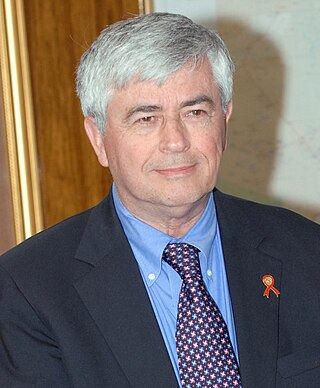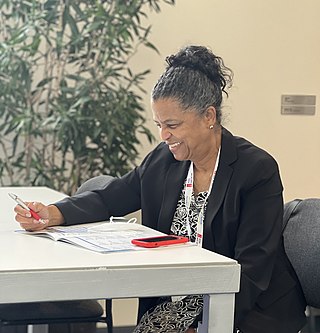Related Research Articles
Thomas Eugene Shenk is an American virologist. He is currently Emeritus Professor of Life Sciences in the Department of Molecular Biology at Princeton University.
Morag Crichton Timbury FRCPG FRCPath FRSE FRCP was a Scottish medical virologist, bacteriologist and science writer.

Myron Elmer "Max" Essex is the Mary Woodard Lasker Professor of Health Sciences, emeritus in the department of immunology and infectious diseases at Harvard University, chair of the Harvard T.H. Chan School of Public Health AIDS Initiative (HAI) in the department of immunology and infectious diseases, and chair of the Botswana–Harvard AIDS Institute in Gaborone, Botswana. Essex was one of the first to link animal and human retroviruses to immunosuppressive disease, to suspect that a retrovirus was the cause of AIDS, and to determine that HIV could be transmitted through blood and blood products to hemophiliacs and recipients of blood transfusions. With collaborators, Essex also provided the first evidence that HIV could be transmitted by heterosexual intercourse.
Geoffrey Lilley Smith FRS FMedSci FRSB is a British virologist and medical research authority in the area of Vaccinia virus and the family of Poxviruses. Since 1 October 2011 he is head of the Department of Pathology at the University of Cambridge and a principal research fellow of the Wellcome Trust. Before that, he was head of the Department of Virology at Imperial College London.
Bernard Nathan Fields was an American microbiologist and virologist. Fields was a member of the National Academy of Sciences.
Almyra Oveta Fuller was an associate professor of microbiology and immunology at University of Michigan Medical School. She served as the director of the African Studies Center (ASC), faculty in the ASC STEM Initiative at the University of Michigan (U-M) and an adjunct professor at Payne Theological Seminary. Fuller was a virologist and specialized in research of Herpes simplex virus, as well as HIV/AIDS. Fuller and her research team discovered a B5 receptor, advancing the understanding of Herpes simplex virus and the cells it attacks.
The American Society for Virology (ASV) is an American scientific society serving the community of researchers in virology. The organization was founded in 1981 and was the first scientific society in the world dedicated exclusively to virology.
Wolfgang Karl "Bill" Joklik was a virologist and James B. Duke Professor Emeritus of Molecular Genetics and Microbiology at Duke University, from which he retired in 1993 after 25 years chairing the department. In 1981, he founded the American Society for Virology, the first scientific society specifically for virologists, and served a two-year term as its founding president. In the same year, he was elected to the United States National Academy of Sciences. He has been described as "one of the earliest molecular virologists" and is best known for his research on poxviruses and reoviruses, and for work on interferon proteins.
Sondra Schlesinger is an American virologist and professor emeritus at the Washington University School of Medicine.

Blossom Damania is a virologist at the University of North Carolina at Chapel Hill. She is known for her work on oncogenic viruses that cause human cancer. Damania has also been serving as vice dean for research at the UNC Chapel Hill School of Medicine since 2016.

Karla Kirkegaard is the Violetta L. Horton Research Professor of genetics at the Stanford University School of Medicine. She was the chair of the Department of Microbiology and Immunology from 2006 to 2010. She is an elected member of the American Academy of Arts and Sciences and the National Academy of Sciences. Her research focuses on virology.
Kenneth Ira Berns is an American virologist who is currently a distinguished professor emeritus at the department of Molecular Genetics and Microbiology at the University of Florida College of Medicine. He is primarily known for his work on adeno-associated viruses (AAV), and his group was one of the first which showed the specificity of the integration of the AAV genomes into the cellular genome. He has been a member of the National Academy of Sciences since 1995.
Xiang-Jin Meng, also known as X.J. Meng, is a Chinese-born American virologist. He is a university distinguished professor at Virginia Tech. He studies emerging, re-emerging and zoonotic viruses of veterinary and human public health significance. He was elected a member of the National Academy of Sciences in 2016, a Fellow of the National Academy of Inventors in 2014, and a Fellow of the American Academy of Microbiology in 2012.
Etta Driscoll Pisano is an American breast imaging researcher. She is a professor in residence of radiology at the Beth Israel Deaconess Medical Center and chief research dean at the American College of Radiology. In 2008, she was elected a member of the National Academy of Medicine.
Lisa O. Roberts is vice chancellor and President of the University of Exeter. She took over from professor Steve Smith on his retirement on 1 September 2020.

Marian Cecelia Johnson-Thompson is an American virologist who was a professor at the University of the District of Columbia. She was elected Fellow of the American Association for the Advancement of Science.
Gueh-Djen (Edith) Hsiung was a virologist and professor emeritus of laboratory medicine. She was one of the first women to achieve the rank of professor at the Yale School of Medicine.

Hans-Peter Sarnow is a German virologist. He is a professor of microbiology and immunology at Stanford University.
Carolyn Williamson is a South African virologist and microbiologist who is a professor of medical virology at the University of Cape Town. She is a fellow of the Royal Society of South Africa and the African Academy of Sciences, and a member of the Academy of Science of South Africa. Her research focuses on HIV vaccine development and prevention of the disease.
Anne Moscona is an American virologist and pediatrician. She is best known for identifying cell entry mechanisms for enveloped respiratory viruses, elucidating general infection mechanisms that apply to parainfluenza virus, Nipah virus, measles virus, and other viruses, and for applying this knowledge to identify antiviral strategies to prevent infection by viruses including SARS-CoV-2. She is frequently consulted as a medical expert during viral outbreaks, including epidemic and pandemic influenza. Since 2016, she has served as the Sherie L. Morrison Professor Microbiology & Immunology, Professor of Pediatrics, and Professor of Physiology & Cellular Biophysics at Columbia University Medical Center in New York City, where she directs the Center for Host Pathogen Interaction. In 2022, Moscona was elected as president of the American Society for Virology, the nation's leading virology research organization, and will lead the organization starting in July 2023. For the last two years she has served the American Society for Virology as Councilor for Medical Virology.
References
- ↑ "Paula Traktman is engaged". The New York Times. 28 April 1991. Retrieved 8 March 2021.
- 1 2 "Mortimer Traktman". The New York Times. 17 September 2008. Retrieved 8 March 2021.
- 1 2 3 "Paula Traktman, Ph.D., appointed Dean of MUSC College of Graduate Studies". The Post and Courier. Charleston, South Carolina. 22 February 2015. Retrieved 8 March 2021.
- ↑ Traktman, Paula (2014). "Reflections of a Virologist and Unabashed Advocate for Basic Research". Annual Review of Virology. 1 (1): vii–viii. doi:10.1146/annurev-vi-1-091714-100011. PMID 29084481.
- ↑ "Interview with Dr. Stephan[sic] A. Duncan & Dr. Paula Traktman". MUSC Health. 2015. Retrieved 8 March 2021.